Medical Referral Letter
[Your Name]
[Your Title/Position]
[Your Clinic/Hospital Name]
[Your Address]
[City, State, ZIP Code]
[Your Email Address]
[Your Phone Number]
[Today's Date]
[Recipient's Name]
[Recipient's Title/Position]
[Recipient's Clinic/Hospital Name]
[Recipient's Address]
[City, State, ZIP Code]
Dear Dr. [Recipient's Last Name],
Referral for [Patient's Full Name], DOB: [Patient's Date of Birth]
I hope this letter finds you well. I am writing to refer my patient, [Patient's Full Name], to your esteemed care for further evaluation and treatment of their medical condition.
Patient Information:
- Name: [Patient's Full Name]
- Date of Birth: [Patient's Date of Birth]
- Gender: [Patient's Gender]
- Address: [Patient's Address]
- Phone Number: [Patient's Phone Number]
- Relevant Medical History: [Briefly summarize relevant medical history and previous treatments]
Presenting Complaint:
[Briefly describe the reason for the referral and the main symptoms or concerns expressed by the patient.]
Preliminary Diagnosis:
[If applicable, mention any provisional diagnosis made by you based on the initial evaluation.]
Results of Relevant Tests:
[Include any pertinent test results, imaging studies, or laboratory findings that may help the specialist in their assessment.]
Reason for Referral:
[Explain the specific reason for the referral and what type of expertise or specialty the patient requires. Be clear and concise in detailing why you believe the patient will benefit from the specialist's care.]
Requested Evaluation and Treatment:
[Specify any particular examinations or procedures you would like the specialist to conduct and what kind of treatment you believe would be most appropriate.]
Patient's Expectations:
[Briefly mention any concerns, fears, or expectations expressed by the patient regarding the referral process.]
I trust that [Patient's Full Name] will be in excellent hands under your care. Your expertise in [specialty/area of focus] will undoubtedly contribute to a comprehensive evaluation and the best possible treatment outcomes for the patient.
Please keep me informed of the patient's progress, and I remain available for any collaboration or assistance required during the course of their treatment.
Thank you for your attention to this referral, and I appreciate your timely assessment and management of my patient. If you have any questions or need further information, please do not hesitate to contact me.
Sincerely,
[Your Name]
[Your Title/Position]
[Your Clinic/Hospital Name]
[Your Signature if a physical letter]
[Enclosures: Any relevant medical reports or documents]
Standard Medical Referral Letter
Subject: Referral to Specialist
Dear [Specialist Name],
I am referring my patient, [Patient Name], aged [Age], for further evaluation and management of [Medical Condition]. The patient has been under my care since [Date] and has undergone preliminary investigations, including [Tests/Examinations].
Please assess and manage as appropriate. Enclosed are the patient’s medical records and test results for your review.
Thank you for your attention to this referral.
Sincerely,
[Doctor Name]
[Clinic/Hospital Name]
[Contact Information]
Provisional Medical Referral Letter
Subject: Provisional Referral for Further Evaluation
Dear [Specialist Name],
This is to provisionally refer my patient, [Patient Name], for further evaluation regarding [Medical Condition]. Initial tests indicate [Brief Findings], and additional specialist assessment is recommended.
Please note that additional investigations may follow and updated reports will be provided accordingly.
Sincerely,
[Doctor Name]
[Clinic/Hospital Name]
Urgent Medical Referral Letter
Subject: Urgent Referral for Immediate Attention
Dear [Specialist Name],
I am urgently referring [Patient Name], aged [Age], due to [Critical Condition/Observation] requiring immediate evaluation and intervention. Preliminary investigations include [Tests/Findings].
Kindly prioritize this patient and provide your expert assessment at the earliest convenience. Attached are relevant reports.
Thank you for your prompt attention.
Sincerely,
[Doctor Name]
[Clinic/Hospital Name]
[Contact Information]
Casual Medical Referral Email
Hi [Specialist Name],
I’m referring my patient, [Patient Name], for your evaluation regarding [Condition]. They’ve had [Tests/Investigations] already. Please see attached records and let me know your findings.
Thanks in advance!
Best,
[Doctor Name]
Referral Letter for Diagnostic Tests
Subject: Referral for Diagnostic Testing
Dear [Lab/Diagnostic Center Name],
Please conduct the following tests for my patient, [Patient Name], aged [Age]: [List of Tests]. The patient has been evaluated for [Condition/Symptoms], and these investigations are necessary for accurate diagnosis.
Attached are prior reports and relevant medical history for reference.
Thank you for your assistance.
Sincerely,
[Doctor Name]
[Clinic/Hospital Name]
[Contact Information]
Heartfelt Medical Referral Letter
Subject: Referral for Further Care
Dear [Specialist Name],
I am referring my patient, [Patient Name], with utmost concern regarding [Medical Condition]. The patient has shown [Symptoms/Findings], and I believe your expertise will greatly assist in providing comprehensive care.
Attached are all medical records to facilitate a smooth continuation of care. Thank you for your dedication and support.
Warm regards,
[Doctor Name]
[Clinic/Hospital Name]
Quick Referral Note
Subject: Patient Referral
Dear [Specialist Name],
Please see my patient, [Patient Name], for evaluation of [Condition]. Relevant records are attached.
Thank you,
[Doctor Name]
[Clinic/Hospital Name]
What is a Medical Referral Letter and Why It Is Needed
A Medical Referral Letter is an official document written by a physician to refer a patient to another specialist, clinic, or diagnostic center for further assessment, treatment, or testing.
Purpose:
- Provides formal communication to specialists or diagnostic centers.
- Ensures continuity of care and proper documentation of medical history.
- Guides specialists on patient background, prior investigations, and the reason for referral.
Who Should Send a Medical Referral Letter
- Licensed physicians or primary care doctors.
- Specialists referring patients to other experts for advanced care.
- Hospitals or clinics when transferring care or coordinating tests.
Whom the Medical Referral Letter Should Be Addressed To
- Specialist doctors in a relevant field for diagnosis or treatment.
- Diagnostic laboratories or imaging centers for tests.
- Hospitals or clinics for secondary evaluation or specialized care.
- Insurance providers when required for claim approvals.
When to Issue a Medical Referral Letter
- Upon identifying a condition requiring specialist evaluation.
- When additional diagnostic tests are necessary.
- For urgent or critical cases requiring immediate attention.
- During patient transfer to another healthcare facility.
How to Write and Send a Medical Referral Letter
- Include patient details: full name, age, and medical history.
- Specify reason for referral and relevant medical findings.
- Attach previous test results, reports, or imaging.
- Use professional tone and clear instructions for follow-up.
- Decide the mode: printed letter for official purposes or email for quick referrals.
Formatting Guidelines for Medical Referral Letters
- Length: 100–250 words; concise but informative.
- Tone: Professional, formal; empathetic if patient-centered.
- Style: Structured with headings, bullet points for tests or findings.
- Mode: Printed for formal referrals; email for fast communication.
- Etiquette: Maintain patient confidentiality and provide complete information.
Requirements and Prerequisites Before Writing a Medical Referral Letter
- Confirm diagnosis or reason for referral.
- Gather all patient records, test results, and medical history.
- Obtain patient consent if sharing sensitive information.
- Determine the appropriate specialist, clinic, or diagnostic center.
Elements and Structure of a Medical Referral Letter
- Subject line indicating the purpose of referral.
- Salutation addressing the specialist or facility.
- Patient details and reason for referral.
- Relevant medical history, findings, and tests conducted.
- Clear instructions or specific requests.
- Closing with physician’s name, designation, and contact details.
- Attachments of relevant medical documents.
Common Mistakes to Avoid in Medical Referral Letters
- Leaving out critical patient information or test results.
- Using vague or unclear language regarding the condition.
- Not providing a clear reason for referral.
- Failing to include physician contact details.
- Neglecting patient consent for sharing sensitive medical information.
Tricks and Tips for Effective Medical Referral Letters
- Keep the letter concise, structured, and clear.
- Include all relevant investigations and attach reports.
- Specify urgency if applicable (e.g., urgent, routine, or follow-up).
- Use professional yet empathetic language for patient-centered referrals.
- Maintain a copy of the letter for your records.
FAQ About Medical Referral Letters
Q: Can referral letters be emailed?
A: Yes, email is acceptable for speed, but printed letters are preferred for formal documentation.
Q: Do I need patient consent to send a referral?
A: Yes, especially when sharing sensitive medical information.
Q: How detailed should the medical history be?
A: Include relevant history, prior tests, and current symptoms; avoid unnecessary details.
Q: Can a referral be urgent?
A: Yes, urgent referrals should be clearly marked and prioritized by the receiving specialist.
After Sending a Medical Referral Letter
- Ensure the specialist or diagnostic center has received the referral.
- Follow up for patient appointment and feedback.
- Maintain a copy in patient records for continuity of care.
- Monitor patient progress and update referring physician as needed.

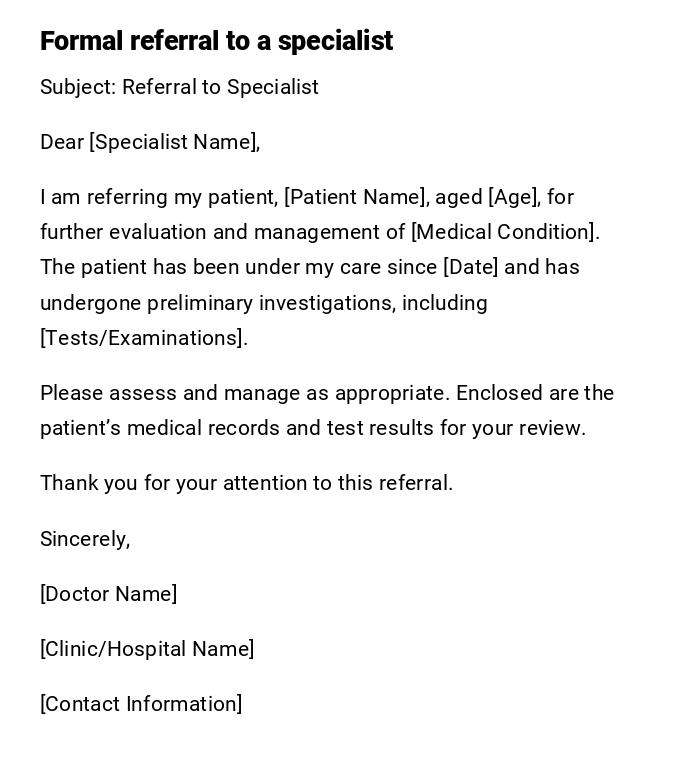
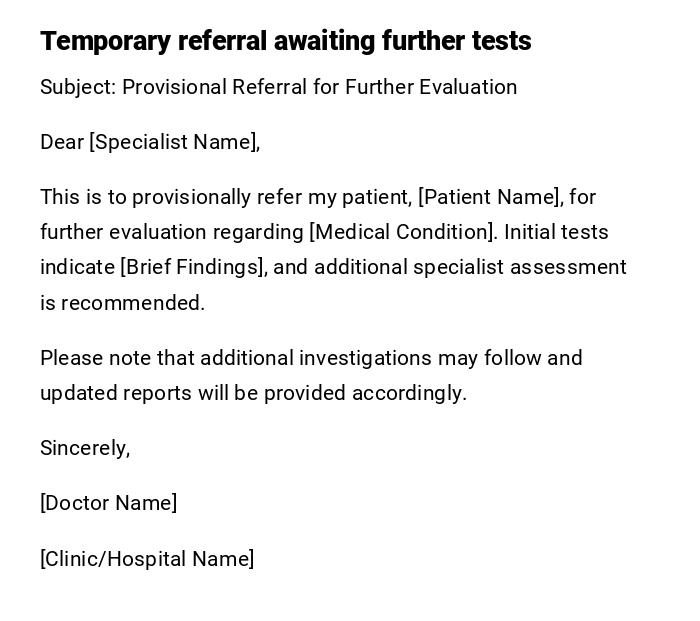
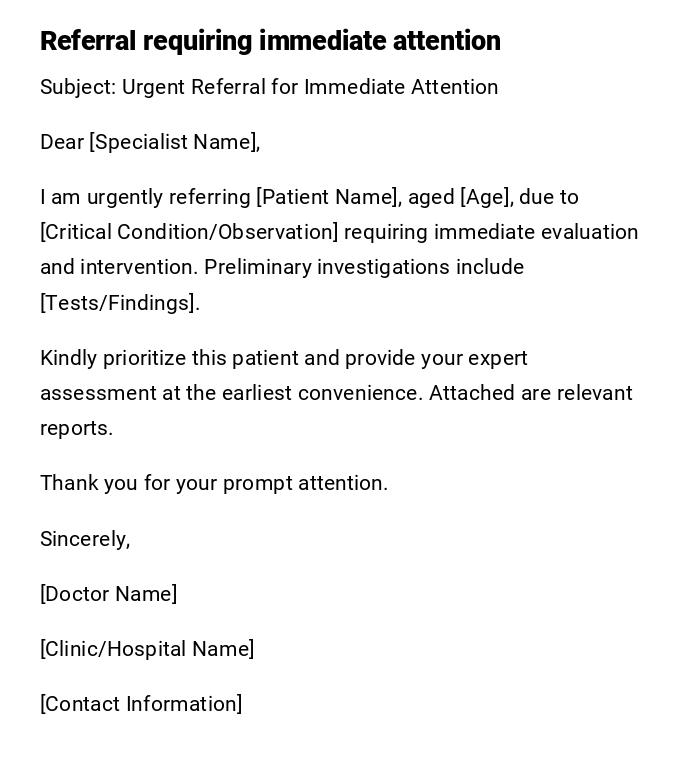
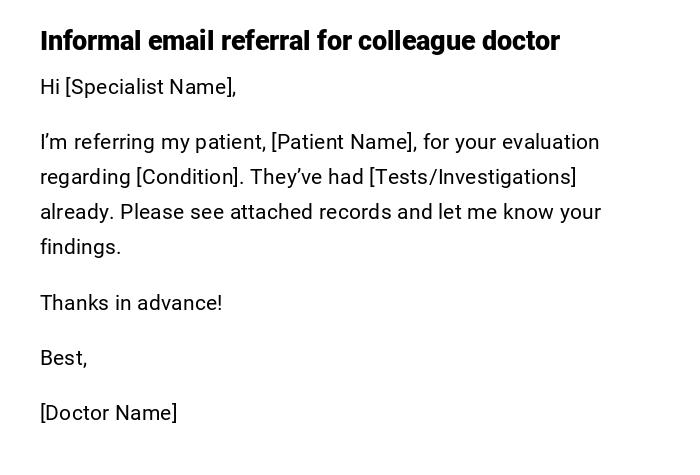
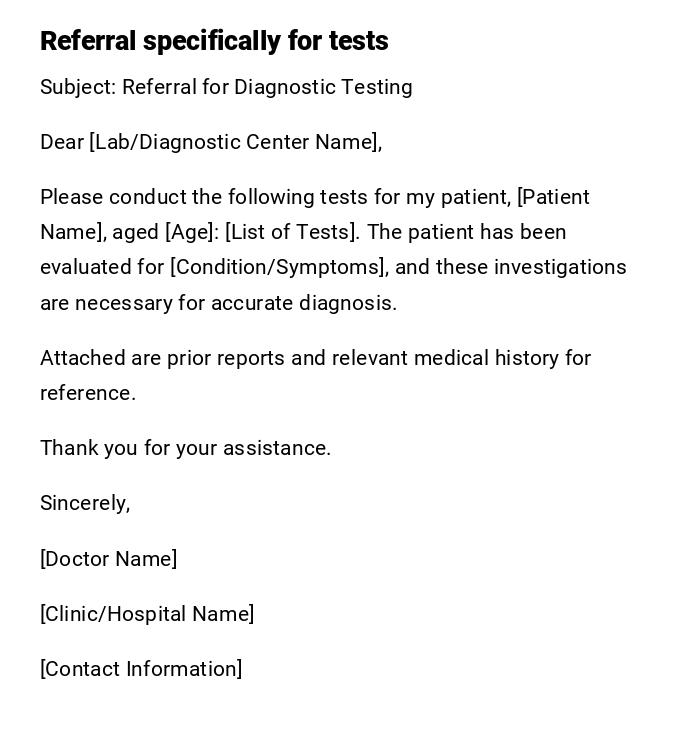
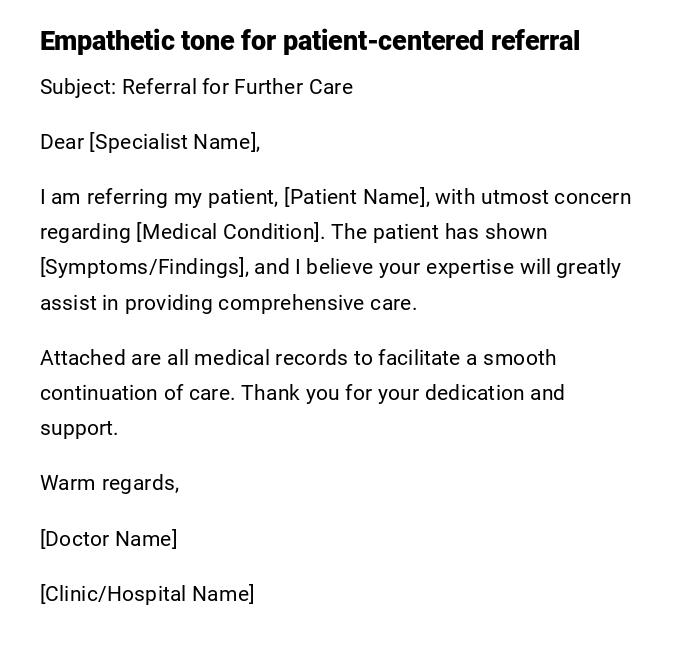
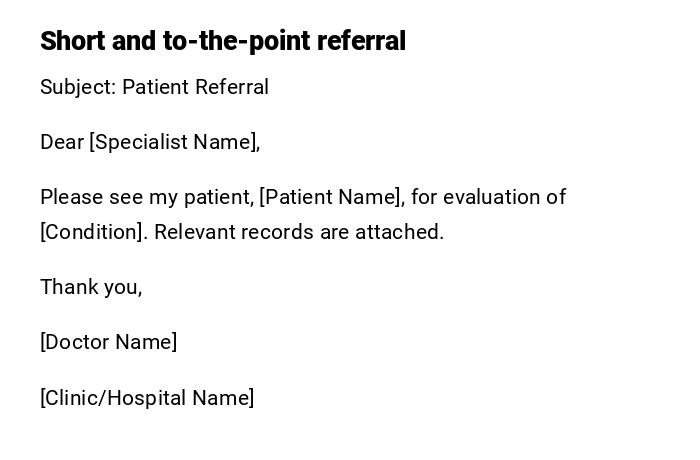

 Download Word Doc
Download Word Doc
 Download PDF
Download PDF